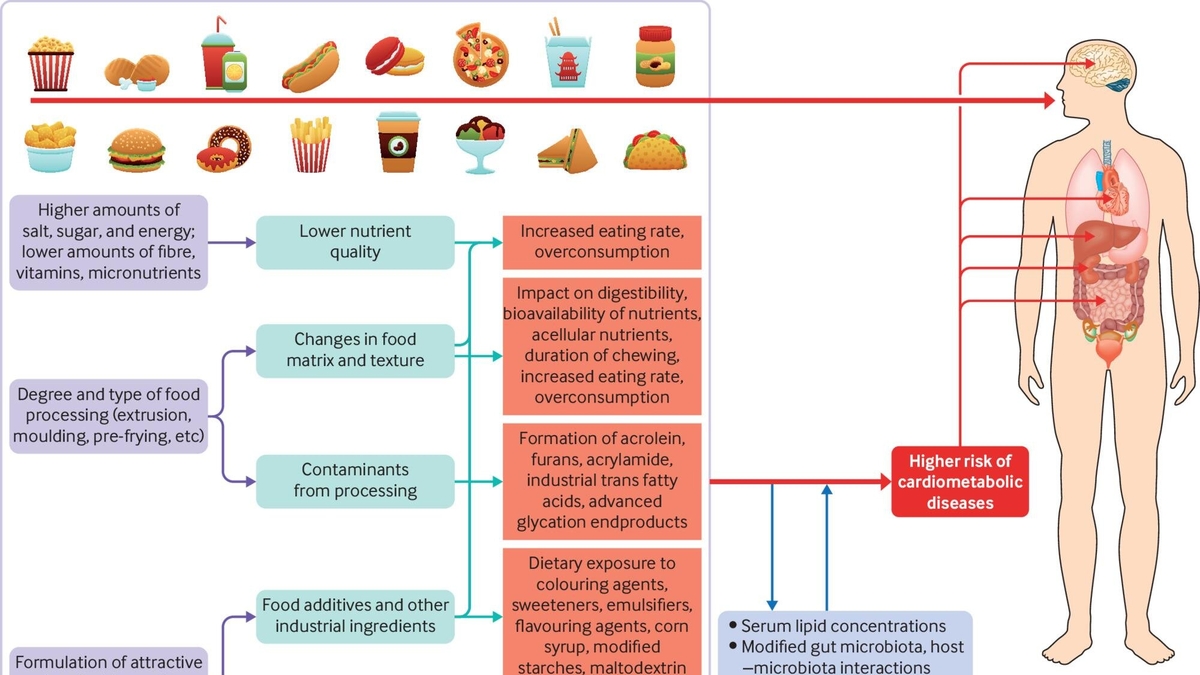
Food processing is an essential part of our modern food system. However, an emerging body of research suggests that a high consumption of ultra-processed foods can be detrimental to our health. The term ‘ultra-processed foods’ refers to products that have undergone extensive processing and contain multiple additives, preservatives, and flavorings. They tend to be more energy-dense, and high in saturated fats, sugar, and salt. These foods are linked to an array of health conditions such as type 2 diabetes, obesity, cardiovascular disease, and even depression.
Research Linking Ultra-Processed Foods to Health Risks
A 2019 study published in the JAMA Internal Medicine found a connection between increased consumption of ultra-processed foods and a heightened risk of developing diabetes. Another research study from Imperial College London suggests a possible association between higher consumption of ultra-processed foods and an increased risk of both developing and dying from cancer. They found that higher consumption of ultra-processed foods was associated with a greater overall risk of developing cancer, specifically ovarian and brain cancers.
Furthermore, a study published in the British Journal of Nutrition found that diets high in ultra-processed foods are linked with a higher risk of overweight and obesity, type 2 diabetes, cardiovascular disease, and depression. This study also revealed that ultra-processed foods tend to have an unhealthier profile on the front of pack labelling than minimally processed foods. The study suggested that the current traffic light system effectively captures food processing and overlaps with the processing categorization of food using the NOVA system.
Consumer Perception and Ultra-Processed Foods
Public perception of ultra-processed foods is increasingly negative. A new study from the EIT Food Consumer Observatory reveals that 65% of European consumers perceive ultra-processed foods as unhealthy, contributing to various health issues. Many consumers, however, are unsure about the extent to which their food is processed, with only half of them actively trying to avoid buying processed foods. This confusion is deterring many consumers from choosing plant-based alternatives to meat and dairy products, despite their potential health benefits.
The Role of Labelling and Education
Clear and informative labelling can play a significant role in helping consumers make healthier food choices. The researchers from Imperial College London suggest that clear front-of-pack warning labels for ultra-processed foods can aid consumer choices. They also recommend extending the sugar tax to cover ultra-processed fizzy drinks, fruit-based and milk-based drinks, as well as other ultra-processed products.
Education and guidance about ultra-processed foods are also crucial. Consumers need to be aware of the health risks associated with excessive consumption of these foods. In addition, the food sector can play a significant role in promoting healthier, minimally processed options. Subsidizing minimally processed and freshly prepared meals can ensure everyone has access to healthy, nutritious, and affordable options.
Conclusion
In conclusion, the current body of research strongly suggests that high consumption of ultra-processed foods is linked with a variety of health risks. As consumers, being aware of these risks and making a conscious effort to reduce our intake of ultra-processed foods can contribute significantly to our overall health and well-being. A focus on diets high in minimally processed foods like vegetables, fruits, and whole grains, along with clear labelling, proper education, and supportive policies, can help us transition to a healthier and more sustainable food system.
